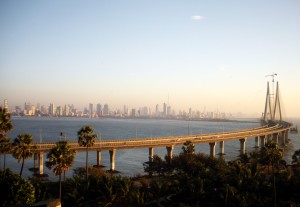Bottom Line: Mumbai is today home to some of the costliest properties and yet the interest level of the NRIs, FDIs and FIIs indicates that they have a positive long-term outlook about the city.
 At a recent seminar on investment into the real estate someone from the audience asked how competitive is Mumbai property when compared with the global benchmark. The panellists, including the private equity players, investment bankers and independent property consultants were unanimous that Mumbai property market is now globally very competitive and the price premium that it commands over some of the key global cities is a testimony of the fact.
At a recent seminar on investment into the real estate someone from the audience asked how competitive is Mumbai property when compared with the global benchmark. The panellists, including the private equity players, investment bankers and independent property consultants were unanimous that Mumbai property market is now globally very competitive and the price premium that it commands over some of the key global cities is a testimony of the fact.
Some of the recent big ticket investments and deals are clearly indicating that the city is globally acknowledged as the investment magnet.
What makes Mumbai a global real estate market to bet on? There are many USPs of the city property market to make it a global property market, like luxury landscape of the city; its positioning as a job market; social life of Mumbai; investment in the city; appreciation potential; and insulation against price crash. Mumbai is one of those markets that have also weathered the slowdown challenges without crash; not even New York, London or Dubai have this distinction.
The above factors collectively tempt not only the NRIs but also other rich and influential foreign nationals to invest in Mumbai. The city that is home to some of the most luxurious homes in the world has also attracted the fancy of wealthy people from across the world with its sea facing apartments.
Advantage Mumbai
Mumbai is one of those markets that have also weathered the slowdown challenges without crash; not even New York, London or Dubai have this distinction
Recent policy changes make Mumbai as transparent market as other global cities
Infrastructure projects add spice to Mumbai’s positioning as a global financial centre
Mumbai’s connectivity with air & sea route make it a global business destination
One distinct advantage that Mumbai has over other global cities in general and peninsular cities in particular is its sprawling edge. The city is growing both vertically and horizontally with infrastructure being rolled out to sustain the growth. With some of the projects in the pipeline, like Mumbai Trans Harbour Link, promising to open the boundaries of the city even further, analysts are bullish that Mumbai’s positioning as a market for long term bet would be further strengthened.
Earlier, a report by Knight Frank titled “Global Cities” pointed out the magnetic forces that make Mumbai a globally competitive property market. It says, “unprecedented investment is now committed for Mumbai’s infrastructure, with a target to complete the projects within an ambitious time frame.”
According to the report, the upcoming infrastructure development would be the key to elevate the positioning of Mumbai further as a global city. For instance, the upcoming US $2.6bn Mumbai Trans Harbour Link (MTHL) is a 22-km, six-lane sea bridge connecting Mumbai to its satellite city, Navi Mumbai. This project will link a residential market costing US $443 per sq ft to another at US $52 per sq ft.
Similarly, the upcoming 36 km Coastal Road, running along the city’s coastline, will be a first of its kind controlled access highway providing high speed connectivity between the north–south corridors of the city. The residential price gradient along the Coastal Road is US $192 per sq ft to US $1,107 per sq ft. Both projects are scheduled to be complete by 2019.
In the case of the metro rail network, the city has seen the implementation of a single, 11.40-km east–west corridor, which took around seven years to build. By contrast, two north–south corridors, spanning a 35-km route, have been envisaged with a target completion date of 2019. The residential price gradient along this metro corridor ranges from US $177 per sq ft to US $266 per sq ft.
As a matter of fact, the recent policy changes have also been catalyst to elevate Mumbai as a globally competitive real estate market in the collective consciousness.
Some of the key changes that are cited to elevate Mumbai’s standing as a globally competitive real estate market are:
Real Estate (Regulation and Development) Act, 2016
Amendment to the Benami Transactions Act
100% deduction in profits for affordable housing construction
Interest subsidy for first time home-buyers
Change in arbitration norms for construction companies
Service Tax exemption on construction of affordable housing
DDT exemption for SPVs to REITs
Implementation of Goods and Services Tax structure
Currency demonetisation of 500 and 1,000 rupee notes
Permanent Residency Status for foreign investors
The stakeholders are equally bullish about the standing of Mumbai on the global arena. Vijay B Pawar, Director, Mirador Dwellers feels the real estate sector has been on the news all through the year and recent policy changes and initiative by the Government of India have impacted the already growing realty sector in the city of Mumbai. These policies have, to an extent, fuelled the real estate industry in Mumbai to meet with the global competition.
“The Government of India announced several major policies right from the Real Estate (Regulation and Development) Act 2016 to the infamous demonetization of INR 500 and INR 1000 currency notes. The Real Estate Act is aiming to ameliorate transparency and bring greater accountability in the real estate industry. The policy for deduction of interest on home loans for first time homebuyers is attracting majority of the public towards suburban and newly developed non-metro areas. Exclusion of service tax on affordable homes of 60 square metres or less is another impactful initiative that will promote construction of affordable houses,” says Pawar.
Vivek Mohanani, Jt. MD Ekta World asserts there is a definite transformation in the real estate sector from being unorganised to an organised one. Being unorganised, cash oriented and lack of governance were major factors that kept the market in a lower light as compared to developed real estate markets of the world. The recent policy changes announced is in the advantage of the real estate sector has placed the Indian Real estate in the global map.
“Initiatives like demonetization, digital initiative for reduced cash usage and GST in the economy leads to more transparency. The emergence of REITs will lead to better value discovery and transparent pricing. RERA plays a vital role in protecting the buyer’s interest. All these efforts and more from the government are expected to lift the real estate to a level playing field versus developed markets in the eyes of global real estate investors and private equity investors,” says Mohanani.
Like many other globally vibrant cities that attract sizeable real estate investments, Mumbai too has its own unique positioning. The city already is the primary financial center for India, housing the major Indian stock exchange like the BSE, brokerages, asset management companies (including majority of the mutual fund companies), headquarters of most Indian state-owned and commercial banks, as well as the financial & monetary regulatory authorities of India (SEBI and RBI among other institutions).
Mumbai also has a cosmopolitan flavor and offers a much better culture for financial services than other cities in the country. Add to it, the connectivity with air and port makes it one of the best global centres to operate. After all, the city is also the gateway to a large consumer market like India.





